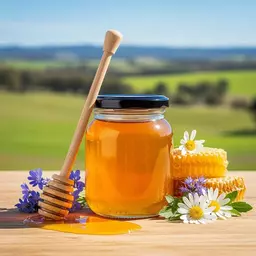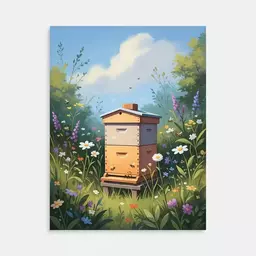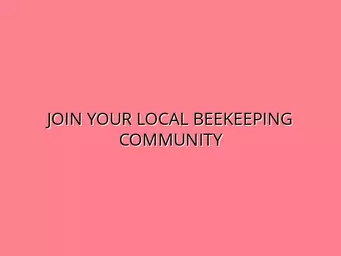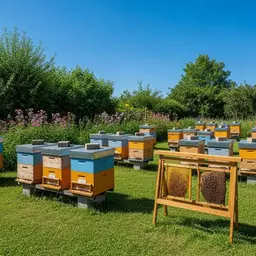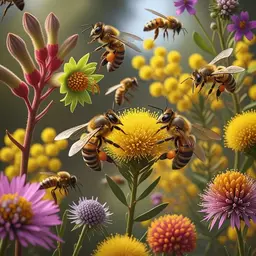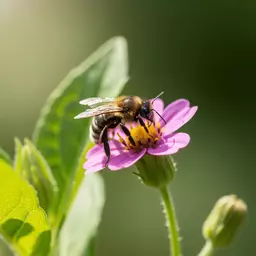Sustainable Beekeeping for Healthy Hives
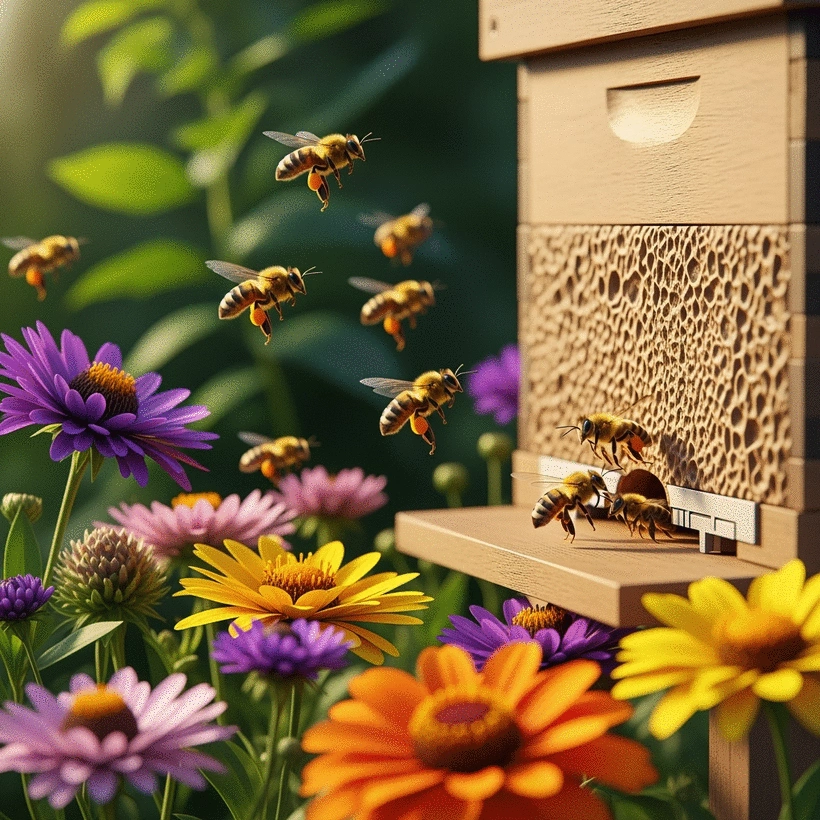
As we navigate the complexities of our environment, one surprising ally emerges: the humble bee. Sustainable beekeeping practices are not just about honey; they are crucial for the health of our ecosystems and biodiversity. What insights can we glean from these practices to ensure a thriving future for both bees and our planet?
What You Will Learn
- Sustainable beekeeping promotes biodiversity and reduces chemical usage, fostering healthier bee populations.
- Adopting these practices leads to improved bee health, enhancing pollination and supporting diverse plant species.
- Climate change significantly impacts bee behavior and floral availability, necessitating adaptive sustainable practices.
- Real-world examples, like Project Apis Mellifera, showcase the positive effects of community-driven sustainable initiatives.
- Technology, such as health monitoring devices and automated feeders, is crucial for advancing sustainable beekeeping methods.
- Regular hive inspections and community workshops are key strategies for maintaining hive health and vitality.
Key Benefits of Sustainable Beekeeping and Modern Advancements
Sustainable beekeeping promotes healthy bee populations and thriving ecosystems. The visual below highlights its core benefits and how technology is aiding these efforts.
Benefits of Sustainable Beekeeping
- Improved Bee Health
- Enhanced Pollination
- Environmental Balance
- Biodiversity Preservation
These practices lead to stronger hives and a healthier planet.
Technology in Modern Beekeeping
- Bee Health Monitoring Devices
- Automated Feeders
- Online Beekeeping Courses
- Smart Hives (temp, humidity, activity)
Innovation enhances care and understanding of bee colonies.
Understanding Sustainable Beekeeping Practices and Their Importance
As an avid apiarist, I've seen firsthand how sustainable beekeeping practices can transform not just our hives, but our entire ecosystems. Sustainable beekeeping is more than just a trend; it’s a commitment to fostering healthy bee populations while protecting our environment. At Nectar Network, we believe that understanding the principles and goals of sustainable practices is pivotal for all beekeepers, whether you're just starting or are a seasoned pro!
So, what exactly defines sustainable beekeeping? It's centered around principles such as promoting biodiversity, reducing chemical use, and ensuring the health of our hives. The ultimate goal is to create a harmonious relationship between beekeepers and their surroundings, leading to healthier bees and a thriving ecosystem.
Defining Sustainable Beekeeping: Principles and Goals
Sustainable beekeeping aims to balance productivity with environmental stewardship. Key principles include:
- Pollinator Protection: Safeguarding bee populations from harm.
- Chemical-Free Practices: Utilizing natural methods for pest and disease management, which, as research suggests from sources like Penn State Extension, can rival or even surpass conventional methods in terms of bee health and productivity.
- Biodiversity Promotion: Supporting a diverse range of floral sources for bees.
By incorporating these principles into our practices, we can work towards healthier hives that contribute positively to the environment. I'm proud to share that at Nectar Network, we emphasize these values to guide our community of beekeepers.
Benefits of Sustainable Beekeeping for Hive Health and Ecosystems
The benefits of sustainable beekeeping extend far beyond the hive! When we adopt sustainable methods, we’re not just helping our bees; we’re enhancing the health of our ecosystems. Here are some notable advantages:
- Improved Bee Health: Sustainable practices reduce stress on bee populations, leading to stronger hives.
- Enhanced Pollination: Healthy bees support the pollination of diverse plant species, which is crucial for food production.
- Environmental Balance: By minimizing chemical usage, we help create a more balanced ecosystem where all species can thrive.
These benefits are vital as they contribute to the overall health of our planet. It's rewarding to see how our efforts can lead to a flourishing environment for bees and other wildlife!
The Impact of Climate Change on Sustainable Beekeeping
Climate change poses significant challenges for beekeepers everywhere. Rapid shifts in weather patterns can affect floral availability, bee behavior, and overall hive health. It's crucial to understand these impacts:
- Altered Bloom Times: Changes in temperature can lead to mismatched timing between bee activity and flower availability.
- Increased Stressors: Bees face additional stress from extreme weather events, affecting their survival.
- Shifting Ecosystems: The habitats native to bees may change, making it essential to adapt our practices.
As beekeepers, we have a vital role in combating these changes. By adopting sustainable practices, we can better equip our hives to withstand the challenges posed by a changing climate. Let's embrace this opportunity to make a positive impact together!
We Want to Hear From You!
As we explore the impact of sustainable beekeeping, we’d love to know your thoughts! What sustainable practices do you currently implement in your beekeeping routine? Share your insights below:
Frequently Asked Questions About Sustainable Beekeeping
Summarizing the Benefits of Sustainable Beekeeping
As I reflect on my journey with Nectar Network, it becomes clear that sustainable beekeeping isn't just a trend—it's a necessity. The benefits extend far beyond the hives, impacting our environment, food production, and even local economies. By adopting sustainable practices, we can foster healthy bee populations and ensure the longevity of our ecosystems.
One of the key benefits of sustainable beekeeping is its ability to preserve biodiversity. Healthy bee colonies contribute to the pollination of a wide range of plants, which in turn supports diverse wildlife. This interconnectedness is vital for maintaining the balance in our natural habitats. Let’s delve deeper into some real-world examples showcasing successful sustainable beekeeping efforts.
Real-World Examples of Successful Sustainable Beekeeping Efforts
Numerous initiatives worldwide demonstrate the positive impact of sustainable beekeeping. Here are a few inspiring examples:
- Project Apis Mellifera: This organization focuses on habitat restoration and enhancing forage for honey bees to support their health and productivity.
- The Bee Conservancy: They promote urban beekeeping and provide resources for city dwellers to foster bee-friendly environments.
- Local Beekeeping Associations: Many regions have seen a resurgence in bee populations thanks to community-led efforts that emphasize education and sustainable practices. A recent survey from the Sustainable Beekeeping Group of Michigan highlights growing trends and successful management strategies among local beekeepers.
These examples highlight how community involvement and innovative approaches can transform beekeeping into a sustainable practice that benefits everyone. By supporting these initiatives, we can collectively ensure a brighter future for our bees.
The Role of Technology and Innovation in Modern Beekeeping
In today’s world, technology plays a pivotal role in advancing sustainable beekeeping methods. From hive monitoring sensors to smartphone applications, beekeepers now have access to tools that help them manage their colonies more effectively. For instance, smart hives can track temperature, humidity, and even bee activity, allowing us to make informed decisions about hive health.
Here are a few technological advancements that are making waves in beekeeping:
- Bee Health Monitoring Devices: These gadgets provide real-time data on hive conditions, allowing for proactive disease management.
- Automated Feeders: They help ensure that bees have access to food without the need for constant human intervention.
- Online Beekeeping Courses: Platforms like Nectar Network offer educational resources that empower new beekeepers to adopt sustainable practices from the start.
Embracing technology not only enhances our understanding of bee health but also streamlines our efforts to provide the best care possible. As we continue to innovate, the future of sustainable beekeeping looks promising!
Bee Health Monitoring: Ensuring Vitality in Your Hives
Monitoring the health of our bee colonies is crucial to ensuring their vitality and productivity. At Nectar Network, I often emphasize the importance of regular assessments. By being proactive, we can catch potential issues before they escalate, protecting our precious hives.
Here are some effective bee health monitoring strategies:
- Regular Hive Inspections: Check for signs of disease, pests, or inadequate food supplies at least once a month.
- Keeping Detailed Records: Document your observations to track changes in hive health over time.
- Participating in Local Beekeeper Workshops: Learning from others in your community can provide valuable insights and techniques for effective hive management.
By adopting these strategies, we can ensure our colonies remain healthy and vibrant, ultimately contributing to the overall ecosystem. Remember, happy bees make for a thriving hive!
Recap of Key Points
Here is a quick recap of the important points discussed in the article:
- Pollinator Protection: Sustainable beekeeping focuses on safeguarding bee populations.
- Chemical-Free Practices: Utilizing natural methods for pest and disease management is essential.
- Biodiversity Promotion: Supporting diverse floral sources enhances bee health and ecosystem balance.
- Improved Bee Health: Sustainable methods reduce stress on bees, leading to stronger hives.
- Climate Change Awareness: Understanding climate impacts helps beekeepers adapt their practices.
- Technological Innovations: Tools like bee health monitoring devices enhance hive management.
- Community Involvement: Engaging in local initiatives fosters sustainable beekeeping practices.
